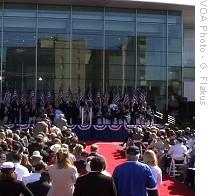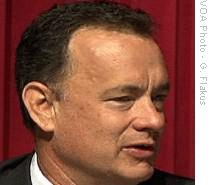New Orleans
09 November 2009
The National World War Two Museum in New Orleans has opened a new $60-million building that houses a musical theater, a restaurant and a large movie theater for what is billed as a four-dimensional multimedia experience. The 35-minute cinematic presentation is titled "Beyond All Boundaries" and it is being shown exclusively at the museum. It is a presentation that brings Hollywood, high technology and history together.
 |
| National World War Two Museum's new $60 million building includes musical theater, restaurant and large movie theater, 06 Nov 2009 |
It involves a film shown on a huge screen, lighting and motion effects and props that appear in the theater as the story unfolds. The audience is immersed in the story and the experience of the war, on all fronts. Words from soldiers, sailors, marines, war correspondents and political leaders are spoken by well-known actors including Brad Pitt, Kevin Bacon, Patricia Clarkson and Jennifer Garner.
Tom Hanks, who portrayed an army captain leading a squad at the Normandy invasion in the 1998 movie "Saving Private Ryan," has been a champion of veterans and the World War Two Museum, donating his time and influence for the cause. Hanks was born more than 10 years after the end of World War Two, but he says it still had a big impact on him.
"As I was growing up in those formative years, every single adult that cared for me had been through the war, had experienced the war somehow, even if they were just alive during it. And they all spoke of it in these terms of an apocryphal era," Hanks said.
But younger generations do not have that sort of connection with the war and some know little about it. The president and CEO of the National World War Two Museum, Nick Mueller, says that is the reason for the multimedia presentation.
 |
| Actor Tom Hanks speaking at the opening ceremony for the National World War Two Museum's new $60-million expansion, 06 Nov 2009 |
"Young people today have grown up with technology. They learn that way and so to be immersed and bombarded by visual images and sound and light and have things moving around that enhance this whole story is the way they learn," Mueller said.
But a group of student journalists who wrote for an online blog about the new museum attraction were more impressed with the veterans they met in person and the stories they told.
"Some stories I heard were just incredible stories and I wanted to cry because they were so, like, moving," she said.
"They have been through a lot. Some of them were sick, some of them were wounded, some were killed. Some of them had relatives that were killed," he said.
One of the veteran volunteers who talks to visitors at the museum is 90-year-old former U.S. Marine Bert Stolier, who witnessed the Japanese attack on Pearl Harbor.
"It was two hours of bombings, torpedo runs, ships exploding, ships sinking, sailors and marines floating in the water," Stolier said.
He went on to fight in various battles across the Pacific and saw much more death and destruction before he could come home again.
There are only a couple of million World War Two veterans left in the United States and they are fast disappearing, dying at a rate of over 900 a day. But their voices are used in many of the museum's video presentations and Nick Mueller says an effort is underway to record even more.
"We have over 3,000 oral histories. We have a group of researchers, we call them the history boys, that are going around the country and they are collecting oral histories for the future exhibits we are building in the campaign pavilion," Mueller said.
He says the idea is not to glorify war or boast of the allied victory, but to educate people about this event in world history that led to the deaths of more than 65 million people.
The carnage is something old veterans like Bert Stolier can never forget. "Time passes and we hope that there is no more, that none of that happens again," he said.
This expansion of the National World War Two Museum is only the latest part of a plan that will involve the construction of three more buildings by the year 2015. The Museum began in New Orleans as the D-Day Museum in 2000 and the US Congress designated it as the National World War Two Museum three years later, expanding its scope to cover he entire conflict.